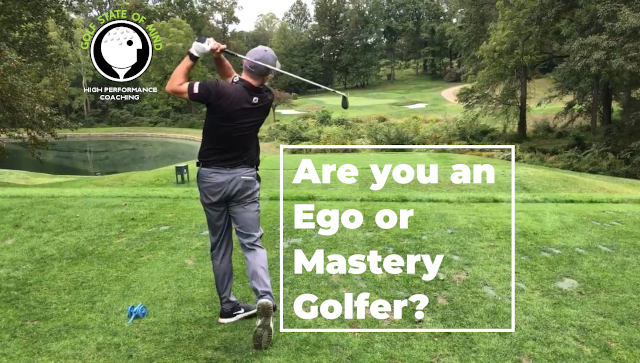
Are you an Ego or Mastery Golfer?
From my experience there are 2 types of golfer – the ego golfer and the mastery golfer. These golfers represent 2 different mindsets and approaches to practice and play.
Nature vs Nurture
One of the biggest differences between the ego and mastery golfer is their perspective on nature vs nurture. An ego golfer is more likely to believe that their talents are inherited and part of who they are, whereas a mastery golfer believes that talents and skills can be developed with effort, over time.
Because they believe that their skills are part of who they are, Ego golfers derive self-worth and their identity from their scores. To an ego golfer, their results make a statement about who they are as a person. Better scores prove to themselves and to others that they are a better person.
Results vs Learning
A mastery golfer is more humble, and values the experience and learning opportunity from each round more than they do the end result. They can detach themselves as a person from their scores and don’t need validation from others. Professor Carol Dweck who has done a lot of research on the effects of mindset, calls these 2 mindsets: Fixed (Ego) and Growth (Mastery) mindsets.
Because an ego golfer’s identity is tied to their score, they feel a lot of pressure to play well. If it goes well they feel great, if it doesn’t go well, they can quickly get frustrated, flustered and down on themselves.
Judegement vs Freedom
Instead of being present and focused on the tasks required during a round, an ego golfer will have a running commentary going through their heads, judging their performance, comparing themselves to others, predicting the future and thinking about what others might think of them because of their play. Their self-talk can become very critical and negative if they don’t play how they think they should.
Mastery golfers play without that judgement and are more in the present moment. They have a different perspective which allows them to play with more freedom, confident that their values and who they are as a person will remain intact, regardless of the outcome of the round. Their measure of success is their inner scorecard – how much effort they put into the process of playing and what they learned.
Perspective on Mistakes
Because mistakes can expose an Ego golfer, they play to avoid them. If they make them, they are taken personally and can cause them to lose confidence quickly. After the round they would rather forget about their mistakes all together.
Mastery golfers value mistakes as being the best opportunity to learn and grow, so they don’t fear making them. For this reason, they are willing to put themselves in challenging and potentially uncomfortable situations that could expose their weaknesses. They don’t judge themselves to have failed if learning and developing their skills is the outcome. They see mistakes as a key part of the iterative process to long-term success and will use the feedback in their deliberate practice for golf. We make mistakes, we learn, we adapt, learn new skills, get better, and so on.
View on what others think
Ego golfers are more interested in impressing others than they are learning from them. They will ignore their weaknesses in exchange for focusing on their strengths. With a curious, beginner’s mind, a mastery golfer is keen to learn from others and receive feedback as much as possible. They are more authentic and objective, and see more clearly what is needed to get better.
Overall purpose for playing
Mastery golfers are connected to a deeper purpose for playing the sport and they gain the highest possible value from the game which is what we learn about ourselves. Ego Golfers are more in love with the image of what their future success looks like. Mastery golfers see the “journey to better” as the success rather than a destination at the end, but ironically they go further and achieve more.
The good news is that wherever you fall on the ego to mastery spectrum, you can begin to move yourself more towards mastery every day. Next time you play, leave your ego behind and learn as much as possible. Be authentic, present and process focused and accept mistakes for what they are and you’ll probably make less of them.



Pingback: Golf In The Zone: 5 Simple Ways To Access Flow In Your Rounds